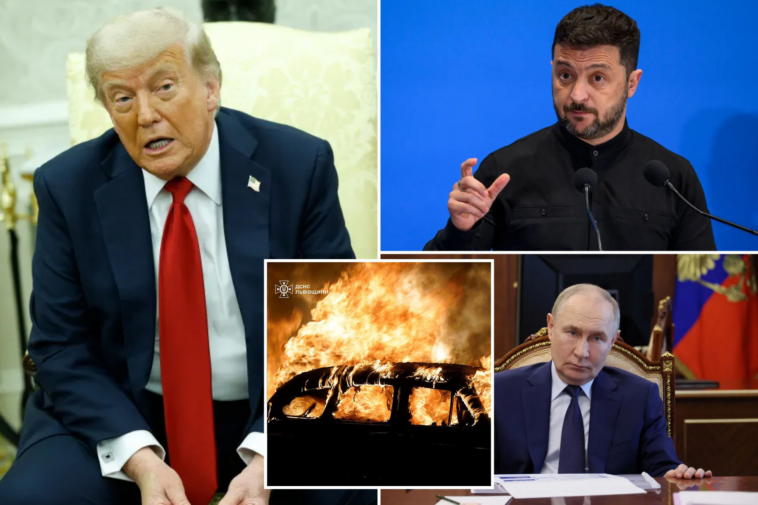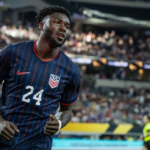President Trump reportedly questioned Ukrainian President Volodymyr Zelensky about whether Kyiv could blast Moscow and St Petersburg, but later indicated publicly that Russia’s capital should be off limits.
“Volodymyr, can you hit Moscow? … Can you hit St Petersburg too?” Trump asked on a July 4 call with Zelensky, a day after the president had a disappointing phone call with Russian leader Vladimir Putin, the Financial Times reported, citing multiple sources.
Zelensky, who has pressed Western powers for years to provide more long-range missiles, reportedly replied, “Absolutely. We can if you give us the weapons.”
The president later clarified to reporters Tuesday that Zelensky “shouldn’t target Moscow” and stressed that he’s “on nobody’s side” with the simple goal of stopping the killing. Trump further said that he has no plans to give Ukraine long-range missiles.
The White House insisted in a statement to The Post that the comments should not be taken out of context, with press secretary Karoline Leavitt pushing back on the Financial Times’ framing of the call, which suggested Trump encouraged Zelensky to step up strikes deep into Russian territory.
“The Financial Times is notorious for taking words wildly out of context to get clicks because their paper is dying,” Leavitt told The Post.
“President Trump was merely asking a question, not encouraging further killing. He’s working tirelessly to stop the killing and end this war.”
Trump’s reported query came after he spoke with Putin and was left convinced that the Kremlin wasn’t going to halt its war machine.
The reported question marks a significant turnaround from Trump’s explosive Feb. 28 Oval Office meeting with Zelensky, in which he raged that the Ukrainian leader was “gambling with World War III” and that “you don’t have the cards right now.”
On Monday, Trump announced a deal with NATO for the US to step up its supply of weapons to Ukraine, including Patriot missile systems and what he called a “full complement” of firepower to the war-torn ally.
The deal could also include offensive weapons, such as long-range missiles to strike deep into Russia, Axios reported Monday. This would be critical for Ukraine as it will enable Kyiv to attack Russian machinery and weapons that have been used to bombard its cities, rather than relying on defensive measures.
Ukraine had carried out a daring military strike deep in Russian territory last month, known as Operation Spiderweb, in which it snuck a fleet of suicide drones into Russia and destroyed about a dozen bombers.
In addition to the plan to send weapons to Ukraine, Trump also gave Putin a 50-day ultimatum to achieve some sort of peace agreement or else face 100% secondary tariffs, meaning countries that do business with Moscow will face the stiff levies.
That economic threat comes as Russia’s economy minister warned last month that his country is “on the brink of recession.”
Over the past three years, Russia has tapped into its National Wealth Fund, printed money and worked to evade the crippling sanctions imposed against it over its bloody onslaught against neighboring Ukraine.
But there are signs that its economic resilience is beginning to crack as the US and Europe look to further tighten the screws and close off workarounds.
Late last month, Putin publicly announced plans to cut Russia’s military budget for next year, but didn’t specify how much.
Throughout his second term, Trump had aggressively sought to broker a peace deal between the two warring countries. In recent weeks, however, the US president vented that he felt Putin was tapping him along.
“I speak to him [Putin] a lot about getting this thing done. And I always hang up and say, ‘Well, that was a nice phone call,’” Trump said of his calls with the Russian leader over the past six months.
“And then missiles are launched into Kyiv or some other city. And I said, ‘Strange.’ And after that happens three or four times, you say the talk doesn’t mean anything.”
Putin “says he wants peace. So far, it’s all talk and no action,” Trump said Tuesday.
“We’re going to find out soon, and it could be before the 50 days,” he told reporters outside Air Force One.
When asked if his wife, first lady Melania Trump, has influenced his thinking on the Ukraine-Russia war, the president responded that she is “neutral” but concerned about the conflict’s death toll.
“She’s very smart. She’s very neutral. She’s sort of like me: She’d like to see people stop dying,” Trump said.
Trump has been adamant that NATO allies will foot the bill for the weapons being sent to Ukraine and that the US will help replenish the arsenals of European countries that transfer firepower to expedite the process.
The move comes as Ukraine is working to survive through Russia’s summer offensive in which the Kremlin has repeatedly broken records for the brutality and quantity of its drone strikes, particularly upon civilian enclaves.
Russia, whose forces have been padded by North Korea and some of its other allies, has sought to deter countries from supplying weapons by threatening to attack Western targets.
Putin has previously warned that the Kremlin is allowed to “use our weaponry against military facilities of countries that allow their weapons to be used against our facilities, and in the case the aggressive action escalates, we will respond just as decisively and symmetrically.”
So far, the Russians have refrained from attacking Western countries.
The Biden administration had been particularly leery of giving Ukraine offensive weaponry that could be used to attack deep in Russian territory out of fear of escalation, but eased up over time.



